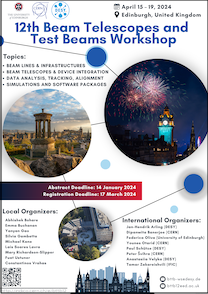Speaker
Description
The Mu3e experiment aims to observe charged lepton flavour violation in the form of the $\mu^+\rightarrow e^+ e^- e^+$ decay. The identification of the decay requires precise spatial and timing resolutions. This will be achieved using ultra-thin High-Voltage Monolithic Active Pixel Sensors (HV-MAPS). This technology combines readout electronics and active detector volume on one sensor, and can be thinned down to 50$\,$µm. The Mu3e tracking detector will be composed of MuPix11 HV-MAPS at thicknesses of 50$\,$µm and 70$\,$µm. A quality control is essential to ensure the functionality of the sensors before installation.
The quality control procedure developed for the MuPix11 sensors evaluates essential functions such as HV biasing, powering, global configuration and data readout. For pre-production of the Mu3e vertex detector, the quality control is carried out on both 50$\,$µm and 70$\,$µm sensors. The testing output characteristic to a functional sensor is identified, and used to develop the testing and evaluation strategies. In addition, the tests are expanded for investigation of frequent failure modes, and improvements are made to reduce errors during testing and evaluation. The quality control yield and the failure profiles are presented for 50$\,$µm and 70$\,$µm MuPix11 sensors.
